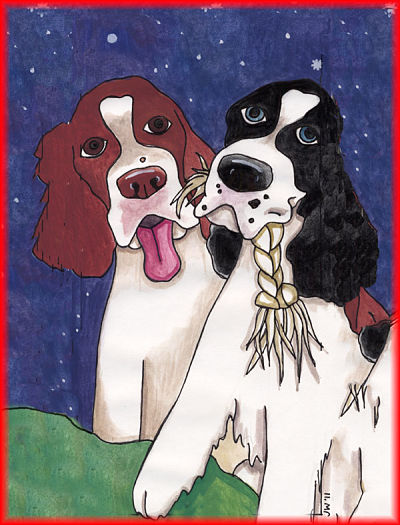Dog Poison Alerts!
Dog poison does not earn a place on the good, healthy dog food list. So let's have a conversation about what dogs are NOT supposed to eat. There is nothing about anything on the following list that constitutes good dog nutrition, in any way at all.
Every year, the ASPCA publishes a list of the ten most common substances that can cause death and/or sickness for dogs. Is there a dog poison lurking right under your nose at home? It is always easier to prevent a problem before it occurs. So let's try to make sure we safeguard our pets, by eliminating the risks.
Top 10 Pet Poisons 2014
- Chocolate - Unbelievable isn't it.? Chocolate has moved to the #1 position. The number of calls at Christmas, Valentine's Day, Easter and Mother's Day have escalated. If you're missing some chocolate, and are not sure that the dog ate it, take him to the vet anyway. Often symptoms do not turn up until much later, and by then it may be too late!
- Rodenticides - Setting bait outside to kill, mice, rats, squirrels etc., can pose a very real risk for your pet. Some of these products can cause internal bleeding, kidney failure and seizures. Most mouse and rat poisons are treated with something that deters children from eating them, but unfortunately dogs are not so discriminating, and they don't read labels.
- Over The Counter Human Medications - Ibuprofen, naproxen and acetaminophen ( Tylenol ) can kill your pet. Never give any medication to your pet without consulting with your veterinarian first. Counter cruising pets steal pill bottles from counters, bed side tables, and scarf down meds that fall on the floor. So store these things safely away and out of reach, including your purse or any carrying bag that may contain pain relievers on the inside.
- Insecticides - These chemicals are used in the home, in the yard and on our pets. Watch out for those bait stations for ants. The fight to rid our home environment of unwanted pests seriously puts our pets at risk. The misuse of flea and tick products and heartworm preventatives are the most common. These are chemical insecticides. Never use dog products on cats! If you are using chemical insecticides for pets, talk to your vet first, so that you understand the correct usage of these products. There are also terrific natural remedies for fleas on dogs and other parasites such as ticks. These are the methods I use for our pets. Instead of chemicals that are potentially toxic to dogs and cats, the natural way keeps me from worrying.
- Xylitol - The newest nightmare on the list. This sugar free sweetener is a dog poison we didn't have to worry about before. Now xylitol is showing up in all kinds of products such as candy, dental hygiene products, supplements, food and medicines,both prescription and non prescription. So please read labels. Xylitol can cause liver failure in your dog.
- Household Products - It is amazing what animals can find to chew up around the house. Everything from fire logs to paint, to household cleaners. Laundry pods are especially dangerous. The detergent ingredients are concentrated, and the pod containers look like food. Some household items can be deadly, corrosive or obstructive to the digestive tract. Others are absorbed through the paws and skin, causing liver problems. Investigate other more natural cleaning products.
- Antidepressants - Prescription medications, and in particular antidepressants, are becoming a big problem because of increased use by humans. The higher the dose, the bigger the problem! If your dog appears to be walking like he's drunk, you'd better check your antidepressant meds.
- Lawn/Garden Products and Plant Fertilizers - Can be made of dried blood, poultry manure and bone meal, and are very attractive to pets. Many herbicides and pesticides are environmental toxins, so a more natural pest deterrent is something you might want to consider using instead of chemicals.
- Raisins and Grapes - No one knows for sure why these fruits are problem, but they are, for some dogs. For dogs who respond poorly, kidney failure is a real possibility. So to be on the safe side, make sure your grapes and raisins are safely out of reach! Raisins are often found in human food such as chocolate bars ( see # 1 ), cereals and granola bars.
- Dewormers - Please do not give dewormers meant for
cattle or horses to your dog or cat. The active
ingredients are often the same, but the
concentration of ingredients is much higher. There are many
natural alternative options to these deworming medications.
Pet Poison Helpline
If you suspect your pet has ingested a toxic dog poison, please contact your veterinarian and/or call the Pet Poison Helpline. The 24-hour hotline number is 1- (855) 764-7661
Go From Dog Poison Back to Home Page
New! Comments
Have your say about what you've just read here. Use the comments box below.
Sharing is appreciated!

